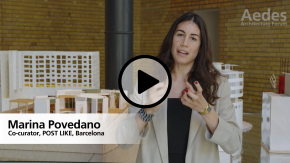The Catalan architectural scene has changed since the economic crisis in Spain of 2008. Despite ongoing challenges, a new generation of architects has successfully established itself in Barcelona in recent years – the Catalan metropolis is now a hotbed of forward-thinking architecture and urban planning. Young, independent practices are exploring site-specific formal languages and construction techniques in innovative ways, often tackling diverse tasks with collaborative strategies. Panorama Barcelona, curated by POST LIKE, presents projects by 15 architectural studios established in Barcelona in the last ten years and one special guest from Berlin. Through a collection of models, the exhibition is not only dedicated to different typologies. It also reflects the shift from a textual to a visual culture in the current global architectural discourse, brought about by new image technologies and communication media.
The exhibition is part of the Aedes Metropolitan Laboratory’s programme: Democratic Design: Cooperation, Collaboration and Compromise.
Today’s new generation of architects in Barcelona, who began their studies in the 2000s and 2010s, experienced a break with the prevailing image of the architect as a cosmopolitan genius and advocate of the neoliberal market. The era of competitions and promotions as an expression of an often iconic architecture ended abruptly with the economic crisis in Spain of 2008. The crisis forced architects to rethink their principles and respond collectively to social, economic and climatic challenges. A new regionalism replaced the earlier globalising vision, with a focus on local languages, building techniques and sustainable awareness.
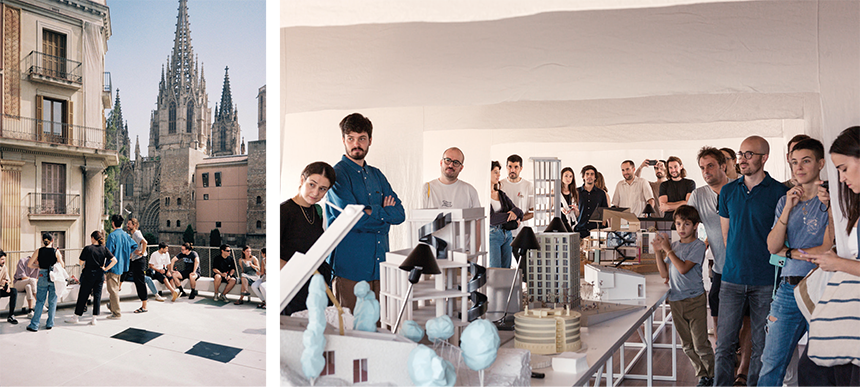
POST LIKE 1st Biennial of Young Architecture in Catalonia in Barcelona, ES, 2023 © Cecilia Coca
“Now, interiors have become the new field of intervention, with private and ephemeral projects at a smaller scale that are the undisputed expression of their time. The scale of these projects has to do with the national economic context, the difficulty of accessing public tenders because of scarcity and the demands of solvency and experience,“ explains the Barcelona-based curatorial collective POST LIKE. “The political will of recent years has been to reverse this trend, with the exceptional success of some young proposals in local (and some international) competitions, allowing the representation of some of the shared values applied to the urban problems of the contemporary city.“
This professional turning point is joined by the discipline’s transition to the visual culture. In contrast to modern architecture, where text conveyed the project's argument, images now depict its meaning. The creation of these images - be it a visualisation through a photograph of an architectural model or a rendering, for example - is influenced by their consumption, often shaped by the unpredictable nature of social media. While this shift may signal the demise of traditional critique, it is fostering a more nuanced and precise architectural practice, particularly evident in refurbishments, interior renovations and small-scale urban interventions.
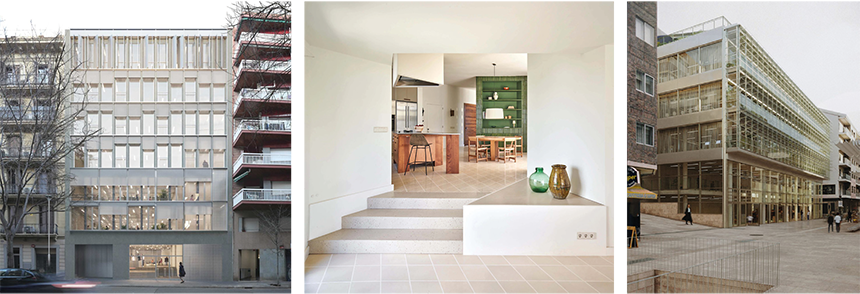
Eixample Offices by IDA in Barcelona, ES, 2021, ongoing © Playtime | Ca l’Ocell by Cierto Estudio in Menorca, ES, 2022 © José Hevia | Multifunctional Building in Sanxenxo by Agencia Material in Pontevedra, ES, 2020, ongoing © Ethandeclerk
Many emerging practices in Barcelona initially focus on domestic projects, driven by market demands and the opportunity for experimental architectural expression. Social trends such as flexible spaces, communal living and teleworking have spurred the rise of housing co-operatives, offering alternative typologies to conventional developments. Moreover, medium-sized firms are facing challenges, leading to a polarisation of the market between large corporations and small studios. In response, young architectural firms in Barcelona are adapting their team sizes and administrative structures. Restrictions on competition for public tenders encourage ongoing collaboration between professionals, blurring traditional studio boundaries.
This combination of contextual circumstances has given rise to a proliferation of new practices that don't seem to compare themselves with previous generations, but rather reinforce the constant crisis as a driving force to transform a fluctuating reality of collective interests and ambitions to build a new architecture.
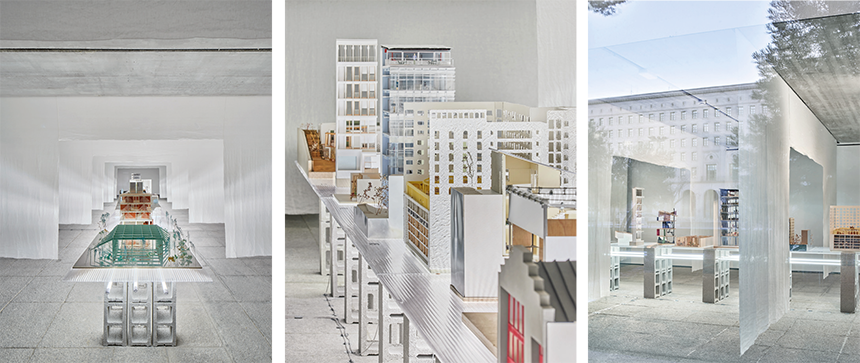
Exhibition view at La Casa de la Arquitectura in Madrid, ES, 2023 © José Hevia
The Exhibition
Panorama Barcelona presents a collection of models by 15 architectural studios founded in Barcelona in the last 10 years and one special guest from Berlin. Curated by POST LIKE, the exhibition was already part of the 1st Biennial of Young Architecture in Catalonia (2023) under the title Nameless Models. The exhibition then travelled to Madrid for the opening of the new cultural centre La Casa de la Arquitectura, which is lead by the Ministerio de Transportes, Movilidad y Agenda Urbana (MITMA).
Selected studios and projects in the exhibition:
Adrià Escolano + David Steegmann: Plaça, Barcelona, ES (public space, 2nd prize competition, 2021)
Agència Material: Multifunctional Building in Sanxenxo, Pontevedra, ES (public market and multifunctional building, under construction, 2026)
AMOO: Londres gardens, Barcelona, ES (urban improvement plan, ongoing, 2021)
Aramé Studio: The Gallery House, Barcelona, ES (housing renovation, ongoing, 2024)
Assut: Masoliver, Barcelona, ES (housing renovation, ongoing)
Atienza Maure: Warehouse in La Pau, Barcelona, ES (housing renovation, under construction, 2024)
Bajet Giramé: La Seda 73 social dwellings, Barcelona, ES (public social housing, under construction, 2026)
Bonell+Dòriga: Bertran, Barcelona, ES (apartment renovation, unrealised project, 2016)
Cierto Estudio: Ca l’Ocell, Menorca, ES (housing, built, 2022)
H3O Architects: The tree house, Ur, FR (housing renovation, unrealised project)
Ida: Eixample Offices, Barcelona, ES (building renovation, under construction, 2025)
MACH: Calasparra City Hall, Murcia, ES (city hall, under construction, 2026)
METRONOM Arquitectura: Social housing in Molins de Rei, Barcelona, ES (35 social housing units and commercial space, under construction, 2024)
Marta Peinado+María Beni: Vallvidrera house, Barcelona, ES (single-family house, unrealised project, 2022)
TEST: Human shelter in an olive grove, Tarragona, ES (housing renovation, built, 2023)
Special guest from Berlin: Beatriz Alés Atelier: Neue Höfe Glückstadt, Schleswig-Holstein, DE (densification and renewal of a housing district, ongoing)
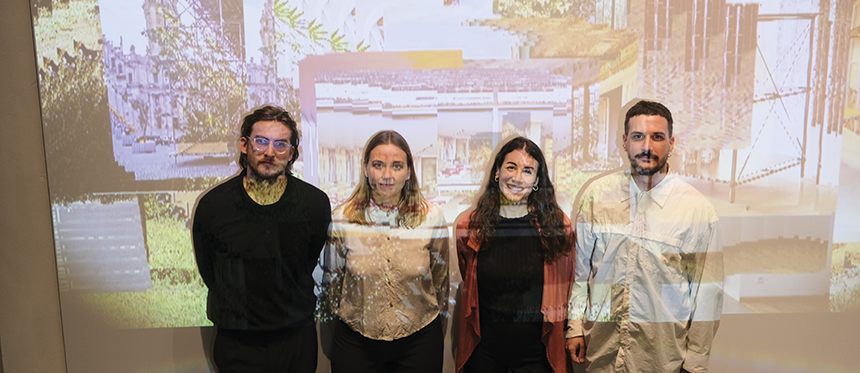
Curatorial team: POST LIKE (Arnau Pascual, Laura Solsona, Marina Povedano, Eduard Fernàndez) © AJAC
Curatorial Team
Panorama Barcelona was curated by POST LIKE. The collective consists of the four Barcelona-based architects Arnau Pascual, Laura Solsona, Marina Povedano and Eduard Fernàndez. POST LIKE curated, among others, the 1st Biennial of Young Architecture in Catalonia – an 11-day festival in Barcelona organised by Dani Montes and Guillem Elvira from the Association of Young Architects (AJAC), in which the collective questioned the role of images and digitalisation in architecture. As part of the Biennial, POST LIKE organised two exhibitions, conferences, collective actions, debates and guided tours in the Colegio de Arquitectos de Cataluña (COAC) and the Mies van der Rohe Pavilion.
The exhibition was made possible with the generous support of
La Casa de la Arquitectura, Ministerio de Transportes, Movilidad y Agenda Urbana (MITMA), Institut Ramon Llull
Project Sponsors
Zumtobel, Embassy of Spain in Germany
